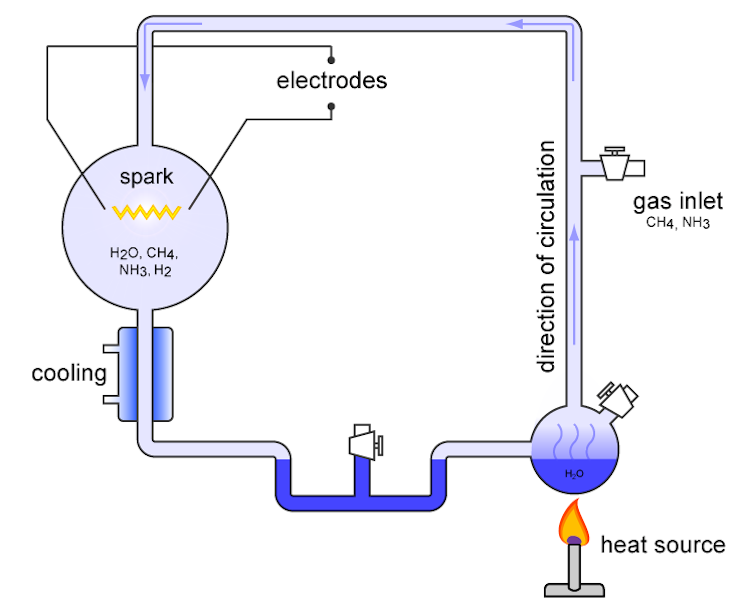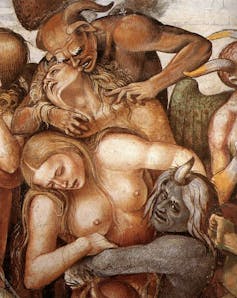Two professors from the University of Lorraine continue the exchanges initiated earlier in “Self-transformation and religion” and “Identity, metamorphosis and the self”. Here they address the question of whether man has reached a “divine” status.
The proposition of Jean‑Pierre Jacquot
To answer the question, it is first useful to ask another one: why in the first place was the notion of God “invented”? It obviously seems a priori that living beings devoid of the capacity of abstraction characteristic of mankind live more or less comfortably in its absence. What is it then, and why was it conceived? It seems to me that the answers to those questions are tightly connected to two questions linked to intellectual curiosity and a third to existential anguish.
The mysteries of matter and life
Possibly from the moment that all humans have had access to reasoning, two mysteries have been the subject of intense speculation: the creation of matter and life. In the incapacity to provide a clear and rational answer to these questions, it was simple and comfortable to postulate the notion of a superior being responsible for the creation of matter and life. The third point, existential angst, can be translated into the question “What will happen to me after my death?”. A calming answer is provided by several religions in the possibility of a survival of the soul, possibly in the form of reincarnation in some philosophies.
In our two first exchanges on the nature of the self, I have proposed that the self is by nature fluctuating, if not unreal, conditioned by the constant exchanges of matter between a given individual and its environment. I also indicated that upon the disappearance/disintegration of an organism, its material parts are redistributed in other organisms, an observation that is finally not so distant from the philosophy of reincarnation or metempsychosis.
It is by no means clear that the latter postulate will be sufficient to calm the anxieties of a majority of humans, but it seems to at least partially answer the question of a possible survival after death. Still, the mysteries of the creation of matter and life remain. In several religions it is suggested that God has first created matter and in a second step turned this inanimate matter into life. In the last decades, biology has brought essential information explaining how biological organisms can arise from inanimate matter. The first crucial experiments concerned “prebiotic” chemistry where Stanley Miller and other colleagues demonstrated as early as 1953 that by submitting a mixture of gases and liquids (ammoniac, methane, hydrogen and water) to high-voltage electric pulses mimicking the early atmosphere of Earth, it was possible to create the building blocks of life (nitrogen-containing bases of nucleic acids and amino acids).

This experiment demonstrated a clear porosity between the mineral and biological worlds. It has been argued that because prebiotic chemistry occurred several billions years ago, there has been more than enough time for life to assemble spontaneously from those building blocks. This possibility is of course vigorously fought by creationists for reasons easy enough to understand, but nevertheless seems highly likely given the time frame considered. Thus it seems not unreasonable to postulate that the mystery of the creation of life no longer exists (recent discoveries on the chemical composition of meteorites suggest that they may have also participated to the initial seeding of organic molecules).
Synthetic biology
Based on advances in molecular biology since the 1980s, more recent experiments have led to the creation of new biological organisms. Craig Venter and his team succeeded in creating a new version of a bacterium called Mycoplasma containing a simplified genome. This experiment is the first describing the creation of an entire biological organism that did not exist previously. Still, at that stage Venter and his team have only introduced new DNA into an existing cell deprived of its own genetic information and thus technically there remains a number of steps for the creation of a totally new biological organism, but this discovery is a key step in that direction. The possibility of creating de novo viruses (organisms that are simpler than bacteria) is already a reality, let’s hope for the best of mankind.
To go back to the philosophic aspects and the three themes that were defined above as tightly linked to the development of religions, it seems to me that we can indeed consider that mankind has indeed reached the status of semi-god – or third of a god, as the creation of life is only one of the three topics raised initially. We are now capable to create life from matter. I will explain in another chapter why this does not make us in any way superior to other living beings. In conclusion, the reader will note with interest that we have addressed only two of the three questions that may be linked to the notion of a superior being. The third, the creation of matter, has not been addressed and certainly remains the biggest unsolved mystery. Unless the physicists indicate to us that matter can be created from the void, we may still need the notion of God at that level.
The response of Roger Pouivet
Is God a human invention? In the beginning of his article, Jean-Pierre Jacquot suggests that the notion of God was “invented”. Hence, God is a human creation who does not exist any more than Santa Claus or Superman. This concept has recently been made explicit by Pascal Boyer in Religion Explained . Let’s notice that Jean-Pierre Jacquot wrote “invented” with quote marks. Is he hinting that God is a strange invention? He also postulates that other living organisms can live rather comfortably in the absence of this concept. God is thus only a mere construction of the human mind and this is exactly what Pascal Boyer suggests. In this way, man answers his curiosity and calms his existential angst.
The genealogy of the idea of God as a need to explain and comfort is a constant in the philosophical thinking – in particular among atheists. Setting aside all historical references, I will only comment on a few aspects.
It is right to say that human beings want to understand why there is something rather than nothing and why things are as they are rather than being different. It is also true that religions seek to explain these questions, but they do so in a variety of ways. For example, polytheistic religions do not believe in a single creator, while pantheist religions do not describe the creation of matter and life as divine. Some religious doctrines are interested in how everything stems from a principle independent from the notion of creation. This constitutes a large number of religions that are not concerned by Jean-Pierre Jacquot’s argument.
Naming the mystery
Monotheism indeed believes in a unique God, the creator of everything. But was this God really “created” in order to provide a clear answer to the question of the creation of matter and life? This would provide an answer, but not a “clear” one or even a fully satisfactory one in the sense that once stated, there is nothing else to ask. Those who assert that God is the Creator have given a name to a mystery rather than to solve it. Reading the Old Testament reveals that the answer given to those who had received Revelation was in fact unclear. The assertion that God was the Creator of the material and biological worlds seems to have led the believers to wonder what they should then believe and do. In what way should we live if we are only God’s creatures? Is the answer of a God who created everything so simple and comfortable as hinted by Jean-Pierre Jacquot? I believe that it is most likely neither.
For Saint Augustin or Saint Thomas, the scenario of Genesis should not be taken literally and in this way they are not creationists in the sense of the term used today. In a recent book, Where the Conflict Really Lies: Science, Religion and Naturalism, Alvin Plantinga affirms that Christian Theism and evolutionary biology – let’s say everything treated by Jean-Pierre Jacquot in the second part of his article – are in fact totally compatible. One can even postulate that modern science was born in part from the idea that reason has created everything and made it understandable, a far cry from being opposed to religion, a scenario preferred by free thinkers but that the history of sciences does not corroborate.

Do we need comfort?
Let us turn now to the need for comfort. In what way is it reassuring to know that you have been created? After all, wouldn’t it be more comforting to believe that we simply stem from a strictly material process that saw the appearance of life first and then of thinking organisms? A non-creationist theory is by no means less comforting… In addition, if after our time on Earth there is another life, it is perhaps even less comforting. According to Christian beliefs, the life after death is also the one of a person who will go to trial and could possibly be damned. The unfaithful for whom everything stops at death might be sad to leave that life, perhaps worried about the future of his offspring, but might also think “That’s it! I am leaving that hell on earth that my life has become”. Isn’t that comforting, too? I am sceptical of the value of using the argument of comfort (like a child would use a teddy bear) for justifying the creation of God.
I do believe that we did not “invent” the notion of God. If God exists, the fact that we, its creature, finally becomes aware of our creator is not so surprising. If we have a notion of God, isn’t it proof that it exists? Thinking that way is an ontological proof of the existence of God. In this respect, I recommend the writings of Anselm of Canterbury, who in the 11th Century formulated this much better than I do now.


